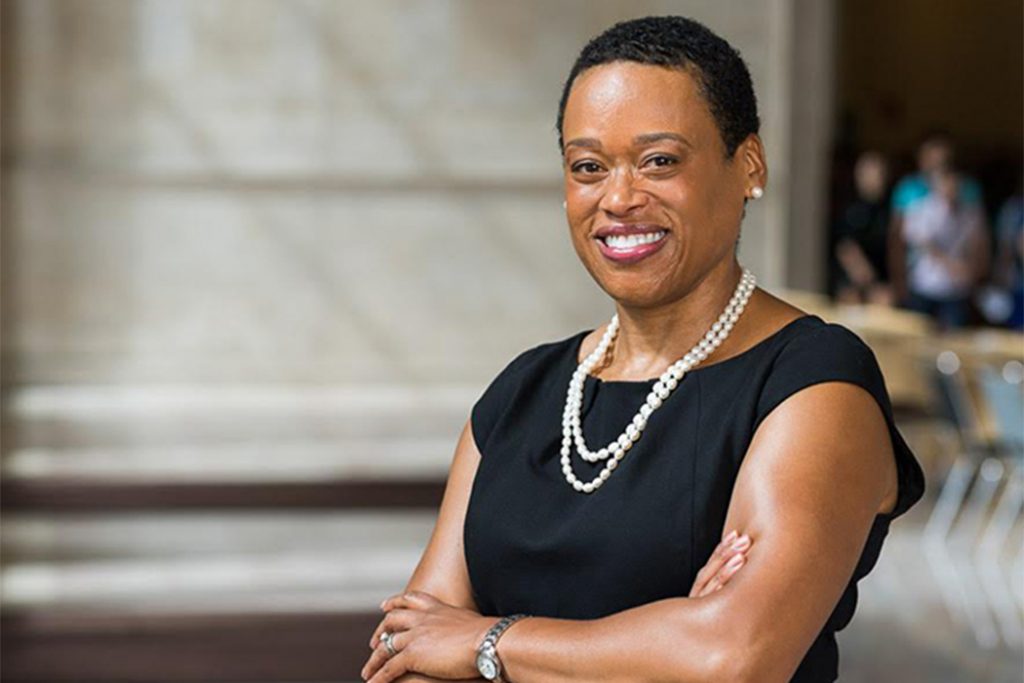As the one-year anniversary of the COVID-19 pandemic comes and goes, the exposed inequities prevalent in our country remain ever present, and the systems of structural racism continue to rage on.
In a co-hosted panel conversation March 11 by the Boston College Black Law Students Association and the Good Governance Project and in partnership with the Clough Center for the Study of Constitutional Democracy, panelists discussed the intersection of racial justice and democracy and how an improved democracy is a conduit for racial justice.
The panel featured Rahsaan Hall, director of the Racial Justice Program for the American Civil Liberties Union of Massachusetts; Melissa Nobles (above), dean of the MIT school of humanities, arts and social sciences and professor of political science; and Massachusetts Secretary of State William Galvin. It featured introductory remarks by BC Law Dean Vincent Rougeau.
Hall said that the ACLU is engaged in several important issues related to ensuring access to democracy for groups that have historically been marginalized or underrepresented in the halls of government. The group is pushing for increased voting access through ballot drop boxes and automatic voter registration.
“Even though Massachusetts is deemed or viewed as a progressive or liberal bastion, there are still opportunities to improve and do much better,” Hall said of democracy reform. “And one of the ways that we do that is increasing access to the ballot and to the system, making sure that there is good representation and that everyone who is eligible to vote is able to be registered and vote. Particularly those in the most disenfranchised, underrepresented and marginalized communities.”
Professor Nobles spoke of how by looking at the history of the United States, one can get a sense of our democracy’s progression over time—and how activism has been the catalyst for change.
“Another way of thinking about the civil rights movement is as a democratization movement,” Nobles said. “It was about substantiating a basic political right of what we think democracy is, which is the right to vote, and what voting entails. I can’t imagine being a fully participating member of a political community without the right to vote.”
Secretary Galvin spoke to the efforts being made in Massachusetts and across the country to increase access to voting and ensure honest election administration. He suggested federal election funds be withheld from states that curtail what he called a “pointed effort” to curtail the rights of their citizens to vote. Galvin added that the election experience in 2020 was very successful, even as the state introduced a number of provisions for the first time because of the pandemic.
“Not only do we have a record participation in all three state elections that we ran last year, the presidential primary, the state primary, and general election. We also had no issues regarding the accuracy and the honesty of the count, no issues whatsoever,” Galvin said.
The speakers also discussed the critically important work of the national census, which factors into redistricting and the distribution of funds to communities. Galvin said he is concerned and alarmed with how the census was taken nationally, despite the time, effort, and resources spent on census collection in Massachusetts. He explained that the state was up against efforts to politicize the census by the Trump administration and significant cuts to door-to-door count, which disadvantaged communities of color.
Galvin said the state is working on a process to make sure the figures collected by the census accurately reflect the population of the state.
Hall said that redistricting is a key to increasing access and opportunity in communities of color so that candidates can be elected that reflect the will of the population.
“If you live within the boundaries of a political community, all members should have, as a philosophical matter, an ability to influence and have some stake in it,” Nobles said. “At least some part of what democracy requires means taking all into account and having their preferences in some way registered. You have to have some idea of what a democracy is, and have the mechanisms align accordingly.”
The panel was part one of the Good Governance’s spring series, with the next event on Privacy and Democracy on March 24. The third event, Faith and Democracy, is on April 13.
The Good Governance Project is also launching a digital platform this month in order to track the group’s legislative priorities: election day registration, early voting and vote-by-mail, and publicly financed campaigns. The platform will map and grade legislators’ votes and co-sponsorships related to the group’s priorities.


